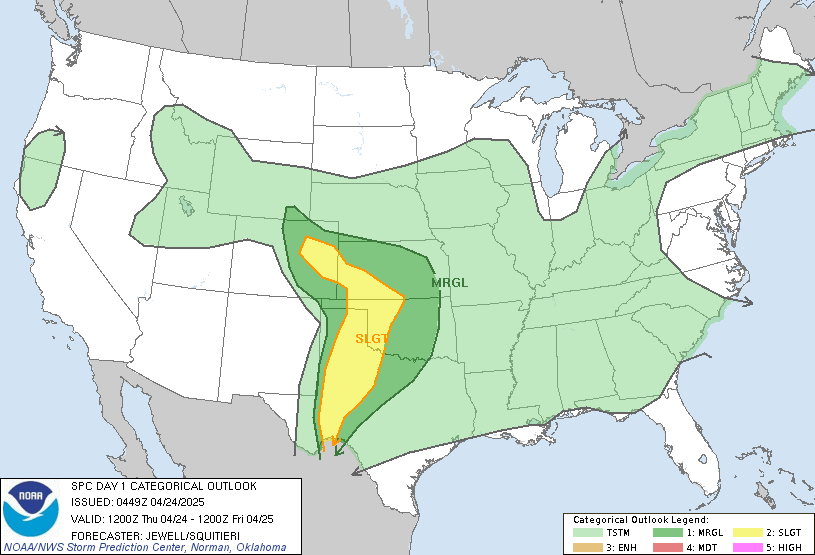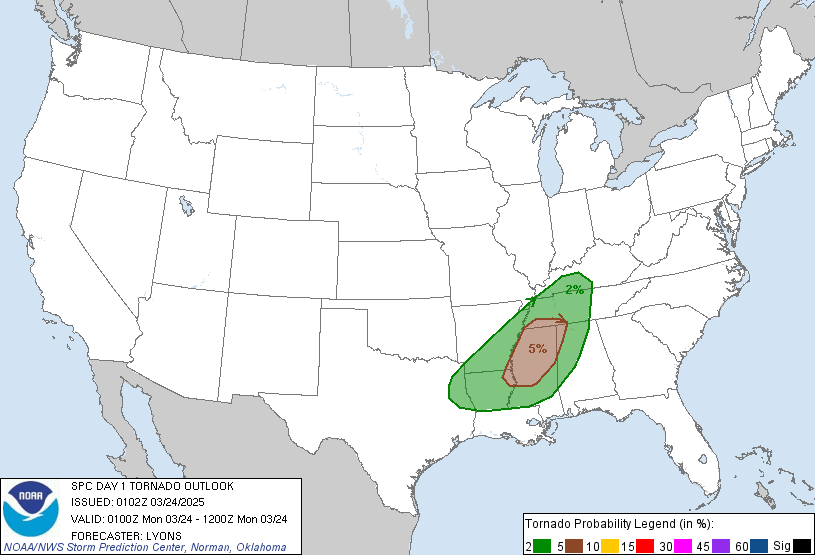The @NWSSPC maintains an Enhanced Risk for South Mississippi pic.twitter.com/vSEO8y4rjj
— Nick Lilja (@NickLilja) January 10, 2020
The SPC still shows an Enhanced Risk during the overnight outlook. They also noted in their discussion that there is a 10-percent hatched tornado risk for South Mississippi.
The threat for severe weather on Saturday for South Mississippi continues. The model data continues to show a pretty good shot for heavy rain, frequent lightning, gusty wind (up to 70mph), hail (up to quarter-sized), and the potential for a tornado or two.
I put together a whole detailed discussion on facebook:
On top of a full severe weather breakdown, that video includes some extra tidbits about how “cold pools” work, why tornadoes form easier in supercells rather than in lines of storms, and how the sunrise stabilizes the atmosphere.
Main concerns
Wind. It is still the wind. Heavy rain and wind. Sustained wind between 5 and 15mph – gusting to 20mph – ahead of the line of storms from about 10am Friday through 8am Saturday will be annoying, but not the wind we are concerned about.
As the storms move through, they will bring with them wind gusts between 50mph and 70mph. And for some, depending on how storm evolution occurs, up to 75mph. This kind of wind can do just as much damage as a weak tornado.
💨Reminder: Straight line winds can cause just as much, if not more, damage as 🌪️tornadoes.
🍃Straight line winds can reach speeds of 100mph & bring down trees, power lines & damage structures. pic.twitter.com/7WL2wfrW83
— NWS Mobile (@NWSMobile) January 10, 2020
The National Weather Service out of Mobile, Alabama points out in a tweet that it doesn’t always take a tornado to do damage. Straight-line wind can still knock down power lines, trees, pull up roofs.
Of course, trees are usually the biggest concern with wind around South Mississippi. The tall pines tend to snap easily in high winds, and others will uproot completely. Given the recent rains across the region, it isn’t impossible that there may be a lot of tree damage from this type of a wind event.
Tornadoes. While this isn’t – necessarily – a main concern, it it probably next up on the list. Brief tornadoes, that form along the leading edge of the line of storms, will be possible. There is also a low-end shot for discrete supercells to form out ahead of the main line of storms. If these develop, these storms would be capable of producing and sustaining stronger tornadoes.
But the likelihood of that developing is pretty low at this point.
Timing
Thsi still looks like a 7am to 2pm event. I’ve buffered an extra hour from the start time, in case discrete cells do form. Teh main line won’t likely make it past I-55 until about 8am or 9am. Then push across south Mississippi between 9am and 1pm. Then it moves into Alabama.
Model Data Discussion
The 00z HRRR model came in a bit relaxed on the threat for severe weather for South Mississippi. While the 00z HRRRR can only ‘see’ up until 6am on Saturday, it shows the line already breaking apart as it passes by I-55. This evolution of the system under the 00z HRRR puts the strongest Low-Level Jet across parts of central and north Mississippi, with the stronger storms there.
That said, the 00z HRRR and HRRR-x keep the overall strong tornado (EF2 or stronger) threat diminished a bit with Updraft Helicity streaks running under 50m2/s2.
The HRW suite of models – there are three – have three reasonably different solutions. I think the most believable is the HRW-ARW model. That seems to be in better agreement with other models on timing and overall evolution. It shows a line of storms passing through south Mississippi between 6am and 1pm. It shows strong wind as the main threat and has a few UH streaks, but none showing values more than 100 m2/s2.
That said, it does show some more robust storms developing across parts of central and northern Mississippi.
The European model continues to come in, and while it isn’t as useful as picking out the finer details, it is still suggesting a slightly slower trek across South Mississippi with a continued chance for some very strong wind and the potential for a tornado or two, but no real threat for a strong tornado, given it can’t resolve the discrete cells ahead of the line of storms.
More to come….


